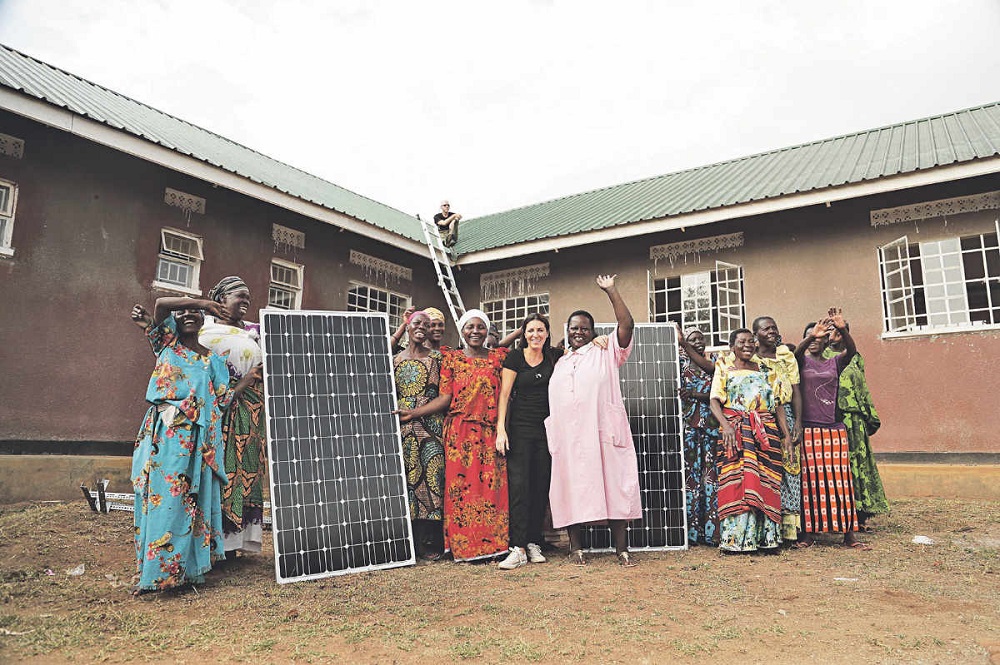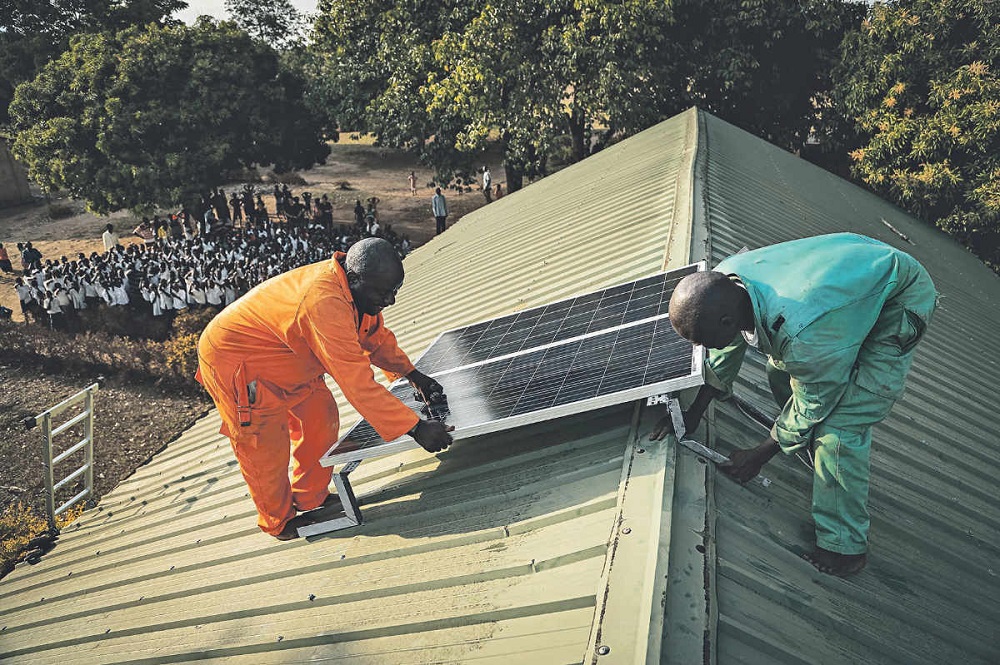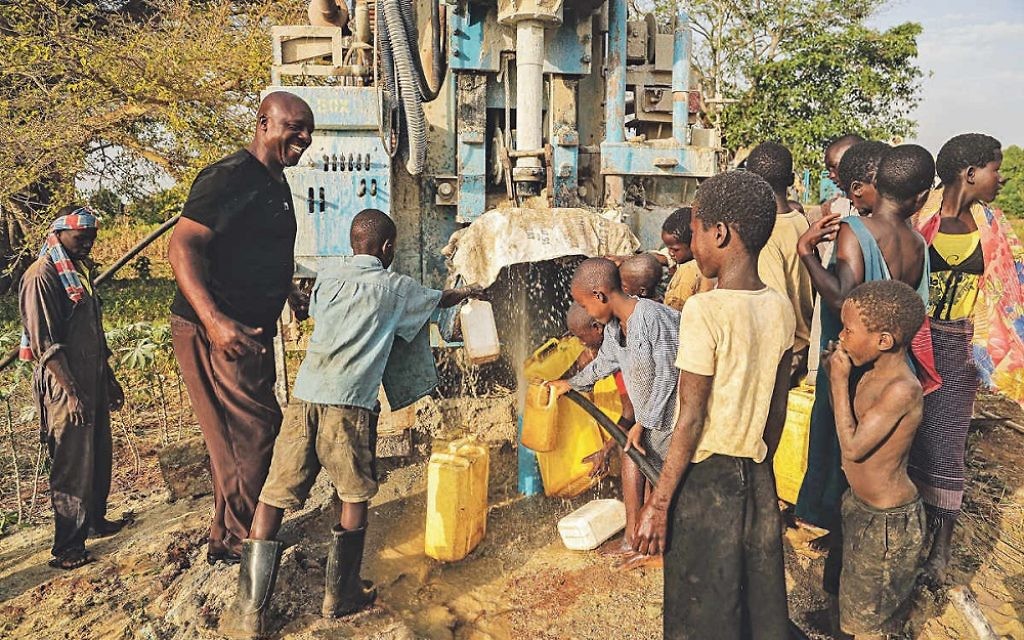Africa gains from Israel’s solar system
A charity that brought solar energy to poverty-stricken villagers is giving thousands of people a new lease of life
The founder and chief executive of an Israeli charity installing solar technology in more than 170 African villages is on her way back to London from Manchester.
Sivan Yaari of Innovation Africa has just been speaking at Manchester Grammar School and explains how one student tugged her heartstrings when he said: “Things like this make me proud to be Jewish and proud of Israel.”
What is it that has just made this youngster so proud? Yaari was telling her audience how her charity installs solar, water and irrigation systems in poor villages in Uganda, Malawi, Tanzania, Ethiopia, the Democratic Republic of Congo, South Africa, Senegal and Cameroon.
Get The Jewish News Daily Edition by email and never miss our top stories Free Sign Up
The mission, Yaari says, is to help Africans beat the poverty trap. “Africa is still in poverty because of the lack of energy. And because there is no energy, people are still searching for water, because there is no energy to pump water.”
Yaari’s personal journey began when she was working for an international textiles firm in Africa 19 years ago. As “desperate” people waited for treatment, she started asking about the local health facilities.
“They said we don’t have vaccines because we don’t have a fridge, and we don’t have a fridge because we don’t have electricity. Women were giving birth with candles and kerosene lamps for lighting. I went to the local school where it was the same, children trying to study in the dark.”
The solution was obvious, but bringing electricity isn’t simple. “It’s not about one or two villages,” Yaari told the TED Talks audience in Tel Aviv in 2016. “It’s a continent, 54 countries.”
In most, she says, most of the population don’t have electricity – that’s about 640 million people, many of whom will never have seen a lightbulb. Satellite images of the world at night show Africa is not lit but for the north and south tips .
So Yaari went to New York to study energy, raised money from friends, bought two solar panels and went back to the medical centre to instal them, providing electricity inside and out. The centre also bought a fridge. Vaccinations started next day. Two weeks later, a doctor agreed to work in the village “because he could now treat the patients”. She did the same with the school.

But who was going to pay for lightbulbs? The village had no money and Yaari wasn’t going to fly from Israel to do it (“that would be an expensive bulb”). That’s when she hit on the idea of the villagers raising the money themselves.
“They don’t have shoes, and few clothes, but they have cell-phones,” she says. “Where do they charge them? Apparently, a guy collects them and takes them to another village where they had a car. People were paying 10 cents to use the car’s battery to charge their cell-phones.”
It gave her the idea to help the medical centre and the school by letting people use the new solar panels to charge their phones – for 10 cents. Word spread, phones were charged. “They had more money than they need,” Yaari recalls. “They had enough money to buy the lightbulbs themselves.”
She rolled the project out to more centres and schools but during a visit one day and asking why there were only a few children there was told famine, with lack of food and – more important – water, had rendered them “too weak to walk”.

“I realised we were fixing the wrong problem,” she said. “People were weak and unhealthy because the water was making them sick. There is water in Africa in the aquifers. What people need is energy to pump it up.”
Project complete, Yaari then added an extra tank “because from Israel I brought drip irrigation, because now they have water, they can grow food with it. No more famine. Just by bringing them water, we changed the village.”
The village displayed entrepreneurial zeal, she says, by selling vegetables and using water to make bricks to make homes and selling these too, three cents per brick.
Today the charity offers Jewish philanthropic families the chance to “adopt” schools, orphanages, medical centres or even whole villages in much the same way Yaari did.
It costs £13,000 to bring solar panels to a school or centre, £35,000 to bring water. Some families see it as a bar or batmitzvah project, others team up as part of a larger organisations, be they synagogues or companies. Some donors are Jewish, others are Christian.
Yaari says: “We know how much energy our projects are producing and consuming, so we can predict problems before they start and protect the investments of our donors, keeping our systems strong and ensuring they provide our communities with the energy they need and deserve.”

Thank you for helping to make Jewish News the leading source of news and opinion for the UK Jewish community. Today we're asking for your invaluable help to continue putting our community first in everything we do.
For as little as £5 a month you can help sustain the vital work we do in celebrating and standing up for Jewish life in Britain.
Jewish News holds our community together and keeps us connected. Like a synagogue, it’s where people turn to feel part of something bigger. It also proudly shows the rest of Britain the vibrancy and rich culture of modern Jewish life.
You can make a quick and easy one-off or monthly contribution of £5, £10, £20 or any other sum you’re comfortable with.
100% of your donation will help us continue celebrating our community, in all its dynamic diversity...
Engaging
Being a community platform means so much more than producing a newspaper and website. One of our proudest roles is media partnering with our invaluable charities to amplify the outstanding work they do to help us all.
Celebrating
There’s no shortage of oys in the world but Jewish News takes every opportunity to celebrate the joys too, through projects like Night of Heroes, 40 Under 40 and other compelling countdowns that make the community kvell with pride.
Pioneering
In the first collaboration between media outlets from different faiths, Jewish News worked with British Muslim TV and Church Times to produce a list of young activists leading the way on interfaith understanding.
Campaigning
Royal Mail issued a stamp honouring Holocaust hero Sir Nicholas Winton after a Jewish News campaign attracted more than 100,000 backers. Jewish Newsalso produces special editions of the paper highlighting pressing issues including mental health and Holocaust remembrance.
Easy access
In an age when news is readily accessible, Jewish News provides high-quality content free online and offline, removing any financial barriers to connecting people.
Voice of our community to wider society
The Jewish News team regularly appears on TV, radio and on the pages of the national press to comment on stories about the Jewish community. Easy access to the paper on the streets of London also means Jewish News provides an invaluable window into the community for the country at large.
We hope you agree all this is worth preserving.
-
By Brigit Grant
-
By Laurent Vaughan - Senior Associate (Bishop & Sewell Solicitors)
-
By Laurent Vaughan - Senior Associate (Bishop & Sewell Solicitors)
-
By Laurent Vaughan - Senior Associate (Bishop & Sewell Solicitors)
-
By Laurent Vaughan - Senior Associate (Bishop & Sewell Solicitors)






















